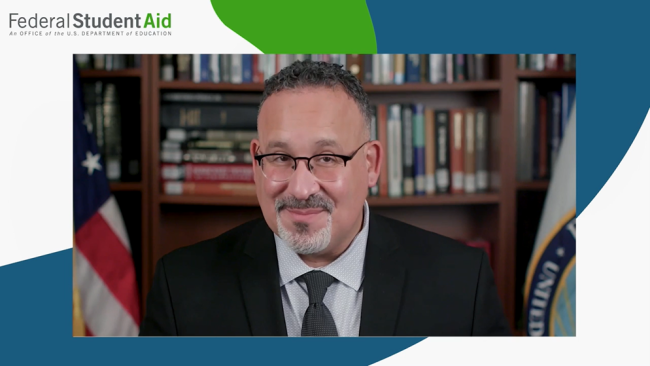You have /5 articles left.
Sign up for a free account or log in.

Secretary of Education Miguel Cardona speaks at the virtual Federal Student Aid Training Conference.
Department of Education
Top officials at the Department of Education were mum during a conference for financial aid professionals this week about whether broad-based student debt cancellation is on the horizon, even as they highlighted the long-term burden that loan debt can place on students.
In their keynote addresses, Secretary of Education Miguel Cardona and Under Secretary James Kvaal condemned the rising costs of college and the larger student loans that are disbursed as a result. But in offering solutions for how to tackle the problem, neither mentioned widespread debt cancellation as a possibility.
“It’s unacceptable that student loans can leave students and their families worse off than if they had never gone to college,” Cardona said. “This cannot continue.”
Cardona said the department is particularly focused on its new plan to provide greater oversight of student loan servicers, so that “student loan borrowers can depend on the Department of Education for support in repaying their loans and receiving quality servicing.” He also referenced the $12.5 billion in targeted student debt cancellation provided this year to nearly 640,000 borrowers who were defrauded by their institutions or are permanently disabled.
Kvaal listed several of the ways that loan debt can negatively impact students and their families, specifically referencing those who don’t complete their programs and are left with debt and no degree, students who do graduate but begin their careers “in a hole and spend years or decades climbing back out,” and family members who also go into debt and have to delay their retirement as a result.
He added that the Build Back Better Act—Democrats’ $1.75 trillion social spending plan passed by the House—would help address college affordability by making $40 billion in investments in education beyond high school. He highlighted the legislation’s $550 increase to the maximum Pell Grant, as well as an additional $400 increase to the grant proposed by the House and Senate Appropriations Committees for the end-of-the-year budget bill, as steps toward doubling the maximum award and increasing access for students.
But advocates aren’t convinced that actions like these will be enough to get the growing student debt burden under control. In a recent letter to President Biden, 105 organizations—including the Education Trust, the American Association of University Professors, the Student Debt Crisis Center and the Student Borrower Protection Center—said canceling student debt would be “the best way to tackle the built-up problems that have caused the student debt crisis.”
“Canceling student debt isn’t just an opportunity to realize the full promise that higher education can provide by allowing each person to build wealth for themselves and their families, but will also be a down payment towards fixing the broken higher education system,” the groups wrote.
Advocates have also argued that canceling debt would help address the racial wealth gap and systemic inequities. Black college graduates have an average of $52,000 in student loan debt and owe an average of $25,000 more than white college graduates, according to data from the National Center for Education Statistics. Four years after graduation, almost half of Black borrowers owe 12.5 percent more than what they borrowed due to interest, while 83 percent of white borrowers owe 12 percent less than they borrowed. And over half of Black students say that their student loan debt exceeds their net worth.
During their remarks, both Kvaal and Cardona referenced the disparate impact that student loans have on borrowers of color.
“The crisis among Black borrowers, in particular, should weigh on our consciences,” Kvaal said. “Nearly 70 percent are projected to eventually default.”
Despite the officials’ acknowledgment of the challenges that student borrowers face, it’s unclear if or when broad debt cancellation will happen. Biden promised it during his presidential campaign but has said he’s waiting for the findings of a memo from the Departments of Education and Justice examining his authority to unilaterally cancel student debt before he takes any action. However, a highly redacted Freedom of Information Act request shows that a draft of the memo has existed since April.
The Office of Federal Student Aid’s chief operating officer, Richard Cordray, emphasized that it is indeed Biden’s decision to cancel student debt—not his. In recent months, Cordray has been questioned, including by lawmakers, about where he stands on the student loan forgiveness debate.
“On general loan forgiveness, many people seem to have a great deal to say, but as the chief of FSA, I do not,” Cordray said. “Whatever [the White House] decides, FSA will faithfully implement.”




